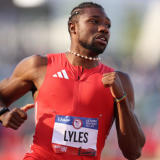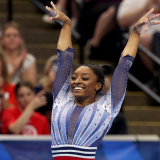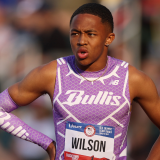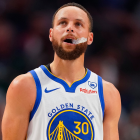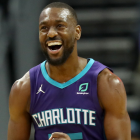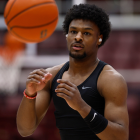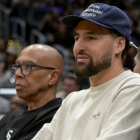There are any number of problems with trying to form some cohesive analysis of Team USA's disappointing performance in Rio during group play of the Olympic Basketball Tournament.
Among them:
- We're talking about five total games. In the NBA, you would say "they had a rough week" and move on. It would be nothing to worry about. There's just very little to take from that sample, especially when two of the wins (against Venezuela and China, the worst two teams in group play) were dominant and level with expectations. We're really talking just about two games, against Australia and Serbia.
- The team has played against the best the world has to offer -- low as that bar is -- with just three weeks of practice time together. There are very few existing relationships on this team, and there isn't the chemistry that the 2012 team enjoyed from their training in 2008 and to a degree in 2010. This squad features many new members of Team USA's actual roster.
- They're still 5-0 with a hyper-dominant 117-point differential, 66 points higher (as of Sunday afternoon) than their closest competitor in that category, Team Australia, who they defeated Wednesday. Until they lose, anything Team USA does will skate under the radar.
- Every performance comes with the caveat that they're playing without their best guys. LeBron James, Steph Curry, Russell Westbrook, James Harden, Chris Paul, Dwyane Wade, John Wall, Damian Lillard, Kawhi Leonard all skipped the Rio Games for various reasons. So this isn't really a reflection of the best that Team USA has to offer.
But this is the team that the U.S. sent to Rio, and they are expected to win every game comfortably by more than 30 points. This year more than in the past two Olympics, Team USA was supposed to dominate in absurd ways. This is due to the diminished level of talent on the other squads as Argentina, Spain and France either faced the aging of "golden generations" or injuries which kept key players out, like Marc Gasol. Team USA has the most NBA representation, and basketball, while invented by a Canadian, is a truly American sport first.
Expectations matter in sports, that's how we judge teams. If you're supposed to be a bottom-dweller and you make the playoffs, it's a great year. If you're a championship contender going in and you barely make the playoffs and exit in the first round, same as the other team, you're a failure. We judge teams based on expectations.
And Team USA is not living up to expectations. So it's time to ask two questions. Why isn't Team USA dominating to expected levels, and is it time to change those expectations?
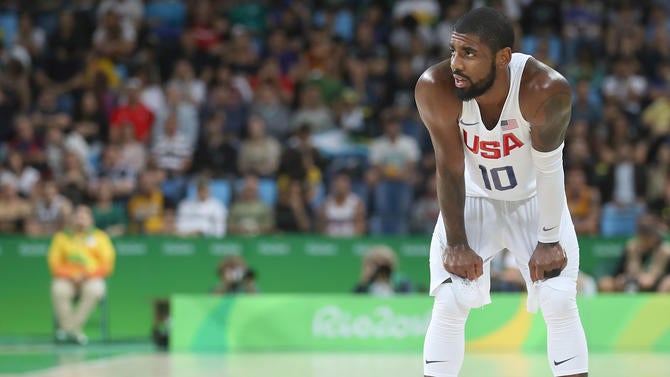
NOT BAD ... BUT NOT GREAT EITHER
Offense
Team USA is shooting 49 percent from the field, tied for third-best with Lithuania, and third in effective field-goal percentage factoring for 3-point shots. They lead all teams in points per possession by a healthy margin, according to Synergy Sports, at 1.11. That's three points worse than the Warriors' epic mark last season, but still very good.
The issues are how often they look out of sync and lost. The problems boil down to four main issues:
1. They need someone to orchestrate the offense, a floor general. Kyrie Irving is a fantastic player in international basketball. Even more so than in the NBA, his style of slicing to the basket, finding 3-point shots and navigating screens makes him in many ways the most pure international-style point guard that Team USA has had in years. What he is not, however, is a guy who sets the table. Team USA would be 3-2 or 2-2 if not for Irving's scoring in this tournament, but that does not mean that he fills the role that they need most. Chris Paul has never put up gaudy numbers for Team USA, but what he did was make sure that the offense ran effectively. When you see Paul George turning the ball over trying to throw an entry pass, or Kevin Durant dribbling the life out of the ball, you realize how much this team needs someone to make sure that assignments, positioning and roles are all being effectively managed. Kyle Lowry is not in that role, he's the backup point guard and in many ways he's the same kind of guy Irving is: a primary scorer in attack mode. This isn't about assists. Rather, it's about the way the offense runs, and in the absence of better chemistry and decision making, not having a guy to make sure that happens -- be it Paul or LeBron James or Dwyane Wade -- hurts the team considerably.
2. They need the best players to try and run offense, not get offense. Carmelo Anthony has been amazing in these Olympics, as he is in every Olympics. A terrific scorer, the go-to guy, and he's pulled their rears out of the fire in the past two games along with Irving to prevent disaster. But what you are seeing from Melo is a lot of what we see from him during his time with the Knicks. His percentage of time in isolation plays have gone up from just 13 percent in 2012 to 25 percent in 2016. That's not his fault; that's the role he's asked to play here, again, without that floor general. Kevin Durant is maybe in a worse spot. He's vacillating between holding the ball and dribbling the life out of it and drifting aimlessly on the wing. Durant took 16 shots against Australia, but was off that day, hitting only four. Against Serbia, he receded into the background, taking just four shots.
There's a world of talent on this Team USA squad so it's easy to see why any player would feel they don't need to dominate the ball. But it's curious that Durant, who is unquestionably the best player on this team, is not taking a more assertive role. Durant in a free-flowing, up-tempo system is a world destroyer and we've seen it time and time again. He was lights out vs. Venezuela and China, because, well, that was against Venezuela and China. But Team USA needs more of Durant playing like Paul George (who's been assertive) and more offensive flow.
3. They aren't using their athleticism to their advantage. Here's what's curious. The 2008 and 2012 teams were both older than this squad. This team is filled with guys under 28, in their primes and full of hyper-athletic guys. Yet they aren't getting out and using their superior speed and athleticism to their advantage. Getting into a half-court battle with Serbia should not be the plan. Trying to drive into the teeth of Andrew Bogut should not be the approach. They have ridiculous amounts of length and athleticism, but haven't been able to get out and run in their past two games. Much of that is tied to their defense (more on that to come).
4. They've just had some guys who aren't playing well. The biggest reason not to worry about this squad is that they have yet to have everyone play their best game. Klay Thompson has been a disaster shooting -- and this is a Splash Brother. DeMarcus Cousins has been in foul trouble constantly. Jimmy Butler is shooting 42 percent. They just haven't gotten everyone in rhythm. When that happens, if that happens, all these other things will fade into the background.
Defense
They don't have the personnel to wreak havoc like they have in the past.
When you run a pick and roll and Chris Paul and LeBron James are diving out to swarm you, with Kobe Bryant or Dwyane Wade coming from the weak side, you have problems. When Tyson Chandler (in his prime) is engaging you and cutting off each and every angle of escape or passing lane, you have problems.
Team USA has great defenders, but they have not been able to cause that kind of mayhem all the time. DeMarcus Cousins is part of this. Cousins, despite whatever angsty, pouty behavior he might engage in, is a good defender.
But he's not able to attack as aggressively in trapping the ball, and that's leading to things like this:
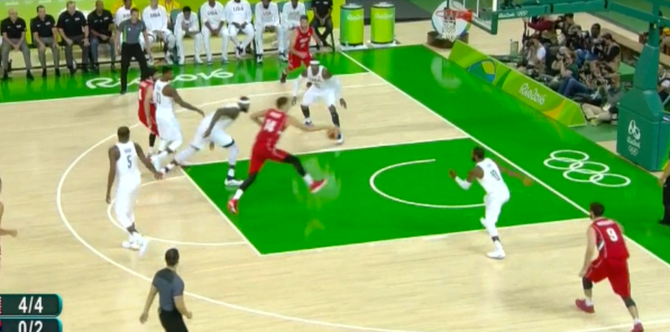
That's Nikola Jokic (25 points vs. Team USA to lead all scorers) getting loose in the pick and roll. Anthony and Irving are frozen on the edges because of shooters and Melo is never going to be able to recover low to block that shot and then get back out on a potential pass-out. Jokic jams.
This would be helped by teams getting over screens better, but there's only so much that can be done. With the full complement, Team USA could balance offense and defense, bring more help, etc. They have fewer players who are elite on both ends, and they could use a bit more energy and focus.
Communication is a problem.
Here's Durant's man going around a screen. Cousins is unsure of what to do, whether he should let his guy go on a switch and jump out or stay home:
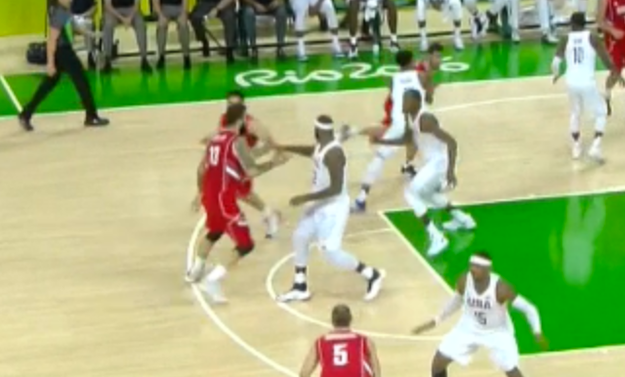
Durant tries to get around Cousins, but they do that awkward thing like when you're on a sidewalk and you both move left at the same time, then both move right, and you both kind of laugh? Only it's not funny here.
In turn, Cousins backs up to give Durant space to go under the screen, which Miroslav Raduljica cuts off with a (very illegal) screen. So now this shooter is wide open, Durant's hung up and Cousins is just hanging out:
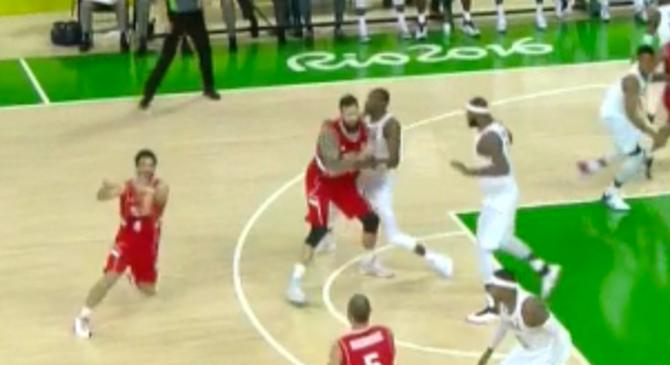
Not great.
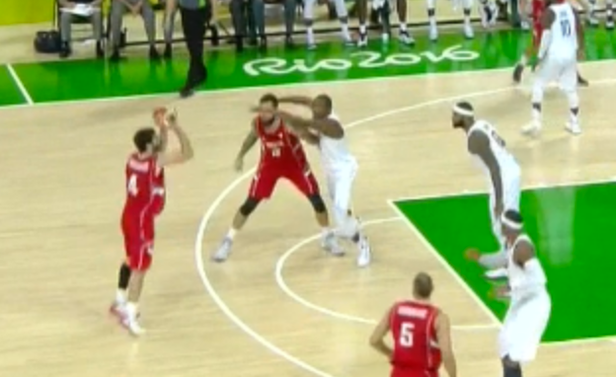
This isn't about Cousins, or Durant. It's about Team USA and the struggles they've had with communication. You're going to have breakdowns (like Durant and Irving having problems with awareness on backcuts, they just happen), but the communication issues on how to work together defensively is an issue, and that's where they're missing a guy like Chandler.
The good defensive units haven't played much together.
Team USA's bench unit with DeAndre Jordan, Jimmy Butler, DeMar DeRozan and Kyle Lowry are stocked with good defensive talent. But that unit struggles to score. So they play short stints, and then Coach K goes back to his starters to try and open the game up with offense. Against Australia, that second unit really locked down and helped Team USA get the game back under control. But then they ran out of gas and Team USA needed the scorers to carry them home, which they did.
It's just an unbalanced roster, and that causes problems. It's weird, because Butler, Durant, Lowry are all top-notch scorers in the NBA, but it feels like Team USA could use even more stratification of role. As in, if they had J.J. Redick and an elite defensive big, they'd be in a better spot. It's been good enough to win though.
THE COACH K CAVEAT
If you look at the above combination of issues for any other basketball team, you walk away saying "this is a coaching problem." Here's the problem.
Every two years Mike Krzyzewski rolls out a Team USA that prompts questions about who makes the cut and who doesn't -- the lineups, the play style, the mentality, everything. And every two years Coach K walks away with the gold. This is one of the best -- if not the best -- coaches in college basketball history, and he is largely responsible for bringing Team USA back from the depths of humiliation they suffered in 2004 and 2006.
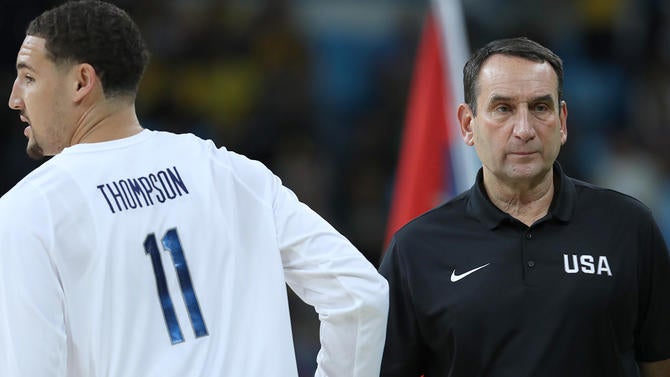
So criticizing him feels ... a little stupid -- more so than criticizing any coach that has worked his way to the top of his field, or any player that is among the world's very best. Even on that scale, this feels ridiculous, especially when again, they're undefeated and still in all likelihood going to win the gold medal.
Furthermore, the decisions always seem to get better with time. Taking Kyrie Irving over Damian Lillard in 2014 was lunacy. Lillard was coming off a playoff run where he led his team in an upset and emerged as a tough-as-nails leader ready to step up and make the big shot. He's also much more of a traditional point guard than Irving has been, and Irving had basically shown he was an injury-riddled near-star who had not really helped make the Cavaliers better.
Irving went on to win FIBA MVP as they won gold. Again.
So it's likely that by the end of medal play, the units Coach K has rolled with will have played better, the communication issues will have been resolved, the strategies will have paid off, and everything looks fine. But if you're going to look to the players as the reason for Team USA's struggles, you have to share that blame with Coach K. But again, "struggling" is a very relative term in this instance.
RE-ALIGNING EXPECTATIONS
Team USA is undefeated. They have beaten their opponents by a combined 117 points. They have the most talent, the best coach and the three-to-five best players in the tournament. Australia is better than expected, and the first team Team USA had faced with real NBA talent. Serbia played considerably better than expected and actually gave Nikola Jokic the ball.
Team USA didn't exactly lay waste to France Sunday in their final game of group play, but still finished undefeated and set themselves up for a strong finish in the quarterfinals and medal rounds. Team USA can turn this around at any point. It's not that there's no need to panic, it's that panic feels like a uniformly silly idea.
Even if they did lose to France, what's the problem? They have clinched the top seed in the quarters, and would still be the favorites to win the gold medal. A loss would likely beat off any lingering rust or laziness and get this team's attention in a way that the close game vs. Australia did not.
The problem is expectations. This is the NBA's team. Even without the premier players, they should trounce everyone by 30. They should not be staging comebacks to Andrew Bogut, Patty Mills and Matthew Dellavedova. They should not be hanging on by the hairs of their chins to Serbia with Jokic and Raduljica. They have Kyrie Irving, Carmelo Anthony and Mr. Make-A-Super-Team Kevin Durant. They are expected to wipe the floor with these teams, and in the last two games, they haven't.
France has been unimpressive in group play. They lost to Australia, and barely survived Serbia by a point. Team USA has a chance to make a statement on Sunday, but if they struggle again, it won't bode well for knockout-round play. France has not been one of the best four teams in the tournament -- Lithuania and Australia have been better, and Argentina certainly looks better on paper.
Australia also did not show what it feels is their best approach in the game against Team USA, I've heard. That they hung with Team USA was a happy surprise. Lithuania has been terrific. There are better teams ahead for Team USA to face than the four of their five wins in group play.
Should Team USA win? Absolutely. But it's time to probably adjust expectations for this squad. Winning gold has to be enough. Expecting the outrageous, laugh-out-loud scores may not be possible for this team. If they accomplish that, it's a credit to the program and the roster, and these two games will have been a blip in an otherwise dominant run. If they fall short of that, however, it has to be enough. Given the state of the roster, and the surprising rise of teams like Australia, the standard for Team USA may simply have to be "good enough to not lose."




